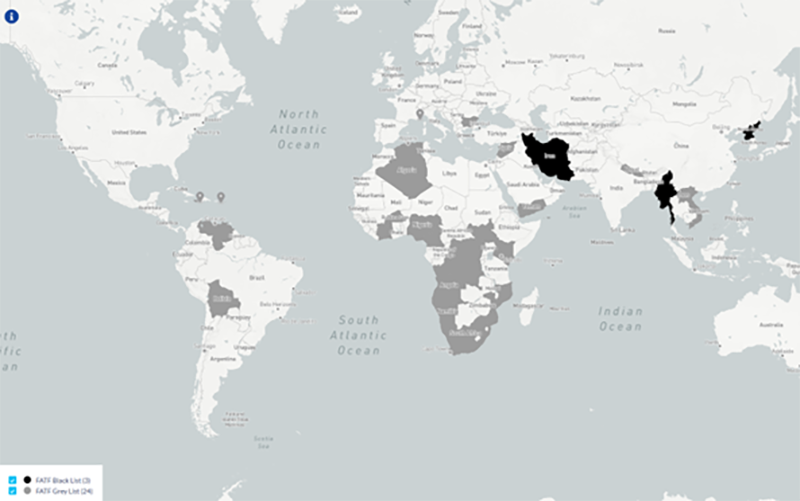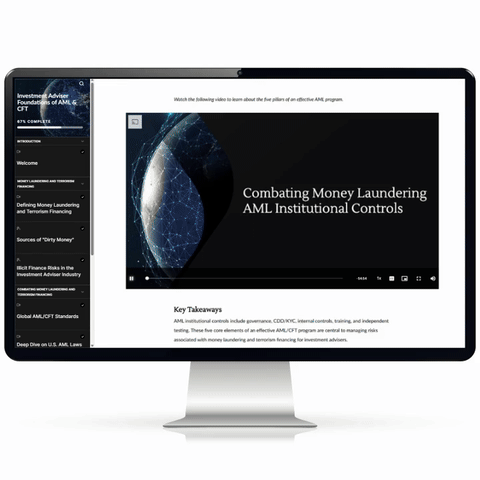FATF’s Recent Risk Map Update
Two added, three removed—here’s the impact
📅 September 5, 2025
📅 September 5, 2025
On June 13, 2025, the Financial Action Task Force (FATF) updated its list of jurisdictions under increased monitoring due to strategic deficiencies in anti-money laundering, countering the financing of terrorism, and counter-proliferation finance. Even though the news cycle has moved on, the changes still matter for compliance teams. If you haven’t already folded them into your risk framework, now’s the time to double-check. Updates like these can shift due diligence requirements, alter how you score customer risk, and even affect correspondent banking ties. Missing those adjustments doesn’t just mean extra work later—it can also invite regulatory questions and reputational headaches.
Every few months, FATF takes the global temperature on money laundering and terrorist financing controls, and June 2025 was no exception. Its review shuffled the list of countries under closer watch, with some added for persistent gaps and others removed after making progress.
After its latest plenary meeting, the intergovernmental watchdog added the British Virgin Islands and Bolivia to its Jurisdictions Under Increased Monitoring (also called the “grey list”) and removed Croatia, Mali, and Tanzania. The High-Risk Jurisdictions Subject to a Call for Action (the “black list”) stayed the same, with Iran, North Korea, and Burma still considered the highest-risk countries.
For compliance teams, this isn’t just background news—it’s a reminder to check that these shifts have been reflected in your programs. Clients or counterparties linked to the British Virgin Islands or Bolivia may now require deeper questions and more frequent monitoring. Exposure to Burma, Iran, or North Korea remains even more sensitive, involving strict prohibitions and enhanced due diligence under U.S. law.
FinCEN’s June 2025 advisory leaves little room for doubt: FATF designations should flow directly into your risk assessments and controls. In practice, that might mean re-scoring jurisdictions in your risk model, updating onboarding checklists, or reviewing correspondent banking relationships. It could also mean preparing business lines for tougher conversations with clients in higher-risk markets. The key is making sure the update isn’t just noted—it’s acted on, so your institution isn’t caught off guard months later.
To help compliance teams quickly visualize FATF’s June 2025 updates, IFI’s interactive FATF Listing Map Tool highlights grey- and black-listed jurisdictions in real time. This resource makes it easier to track changes after each plenary and fold them into your institution’s risk assessments.

FATF’s updates are a reminder that compliance isn’t static; it’s a moving target shaped by global events and regulatory priorities. Staying ahead means not only reacting to updates but understanding the “why” behind them and embedding that insight into daily operations.
Our Foundations of AML/CFT course is designed to help compliance professionals do just that. From interpreting FATF guidance to applying risk-based controls in practice, the course equips you to turn regulatory developments into stronger, more resilient compliance programs.
FATF updates aren’t just headlines—they’re operational triggers that demand quick, informed action. Our Foundations of AML/CFT course equips compliance professionals to:
Stay ahead of evolving threats.











 Terrorist Drug Trafficking Organizations
Terrorist Drug Trafficking OrganizationsThis site uses cookies. By continuing to browse the site, you are agreeing to our use of cookies.
Accept settingsHide notification onlySettingsWe may request cookies to be set on your device. We use cookies to let us know when you visit our websites, how you interact with us, to enrich your user experience, and to customize your relationship with our website.
Click on the different category headings to find out more. You can also change some of your preferences. Note that blocking some types of cookies may impact your experience on our websites and the services we are able to offer.
These cookies are strictly necessary to provide you with services available through our website and to use some of its features.
Because these cookies are strictly necessary to deliver the website, refusing them will have impact how our site functions. You always can block or delete cookies by changing your browser settings and force blocking all cookies on this website. But this will always prompt you to accept/refuse cookies when revisiting our site.
We fully respect if you want to refuse cookies but to avoid asking you again and again kindly allow us to store a cookie for that. You are free to opt out any time or opt in for other cookies to get a better experience. If you refuse cookies we will remove all set cookies in our domain.
We provide you with a list of stored cookies on your computer in our domain so you can check what we stored. Due to security reasons we are not able to show or modify cookies from other domains. You can check these in your browser security settings.
These cookies collect information that is used either in aggregate form to help us understand how our website is being used or how effective our marketing campaigns are, or to help us customize our website and application for you in order to enhance your experience.
If you do not want that we track your visit to our site you can disable tracking in your browser here:
We also use different external services like Google Webfonts, Google Maps, and external Video providers. Since these providers may collect personal data like your IP address we allow you to block them here. Please be aware that this might heavily reduce the functionality and appearance of our site. Changes will take effect once you reload the page.
Google Webfont Settings:
Google Map Settings:
Google reCaptcha Settings:
Vimeo and Youtube video embeds:
You can read about our cookies and privacy settings in detail on our Privacy Policy Page.
Privacy Policy